人教版高中英语选修八Unit 1第5课时(语法)教案
人教课标版高中英语选修8 Unit1_Grammar名师教学设计
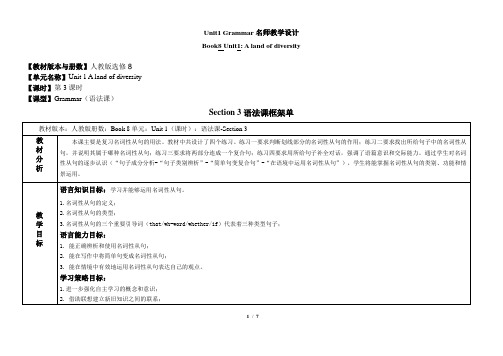
2.T: From the analysis of the sentence patterns, can you tell me what types of noun clauses are there.
S:Noun clauses are classified as subject clause, object clause, predicative clause and appositive clause.
It happened that…碰巧…
It appears that…似乎…
4It is+过去分词+从句
It is reported that…据报道…
It has been proved that…已证实…
It is said that…据说…
it作形式主语和it引导强调句的比较
it作形式主语代替主语从句,主要是为了平衡句子结构,主语从句的连接词有变化。而it引导的强调句则是对句子某一部分进行强调,无论强调的是什么成分,都可用连词that。被强调部分指人是也可用who/whom。例如:
DELC2获取新知识
Step2
Production
(学习
新知)(20mins)
1.Teacher guide Ss to learn the grammar rules of noun clauses.
名词性从句
【概念与分类】在句子中起名词作用的句子叫名词性从句。名词性从句的功能相当于名词词组,它在复合句中能担任主语、宾语、表语、同位语、介词宾语等,因此根据它在句中不同的语法功能,名词从句又可分为主语从句、宾语从句、表语从句和同位语从句。
It hasn’t been decided whether (if) we shall attend the meeting.
人教版高中英语选修八第一单元语法课教学设计.docx
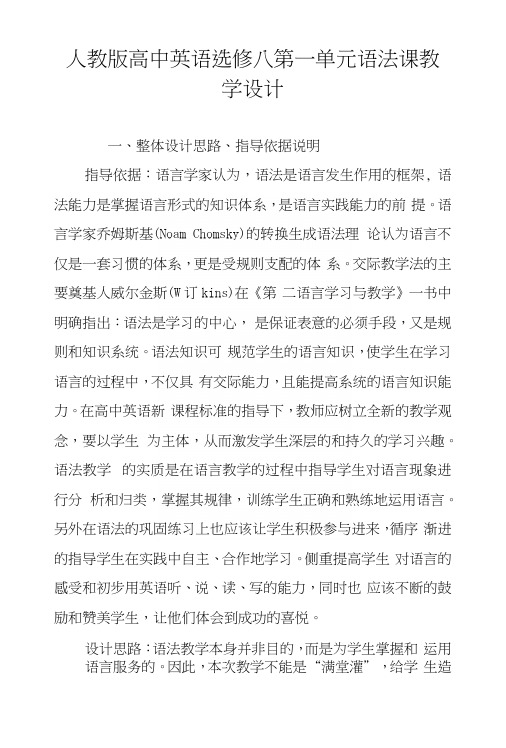
人教版高中英语选修八第一单元语法课教学设计一、整体设计思路、指导依据说明指导依据:语言学家认为,语法是语言发生作用的框架, 语法能力是掌握语言形式的知识体系,是语言实践能力的前提。
语言学家乔姆斯基(Noam Chomsky)的转换生成语法理论认为语言不仅是一套习惯的体系,更是受规则支配的体系。
交际教学法的主要奠基人威尔金斯(W订kins)在《第二语言学习与教学》一书中明确指出:语法是学习的中心,是保证表意的必须手段,又是规则和知识系统。
语法知识可规范学生的语言知识,使学生在学习语言的过程中,不仅具有交际能力,且能提高系统的语言知识能力。
在高中英语新课程标准的指导下,教师应树立全新的教学观念,要以学生为主体,从而激发学生深层的和持久的学习兴趣。
语法教学的实质是在语言教学的过程中指导学生对语言现象进行分析和归类,掌握其规律,训练学生正确和熟练地运用语言。
另外在语法的巩固练习上也应该让学生积极参与进来,循序渐进的指导学生在实践中自主、合作地学习。
侧重提高学生对语言的感受和初步用英语听、说、读、写的能力,同时也应该不断的鼓励和赞美学生,让他们体会到成功的喜悦。
设计思路:语法教学本身并非目的,而是为学生掌握和运用语言服务的。
因此,本次教学不能是“满堂灌”,给学生造成“繁、难、杂”印象。
学习语法最好的方法是在“用” 中学。
因为本节课为语法复习课,学生对所复习内容已经比较熟悉,所以本节课的教学模式可归纳为“再呈现一一再发现一一再归纳一一实践一一活用”。
首先让学生再次发现语法现象,并帮助他们重新归纳出语法结构形式与功能。
最终使学生真正掌握并能活用所学语法结构并应用到实际的读、说、写中去,达到语言学习的最终目的。
具体授课过程缩略图:(见图1)二、教学背景分析教学背景分析:本单元的语法为名词性从句,因为之前名词性从句是连贯初中到高中的英语重点语法概念,也是历年高考英语考试的一个考查热点。
纵观历年高考英语,我们就能发现:英语高考对于名词性从句考查的重点就是名词性从句的引导词的选择、引导词之间的区别、名词性从句的陈述语序以及主从句时态一致性原则等。
人教课标版高中英语选修8Unit5语法导学案设计
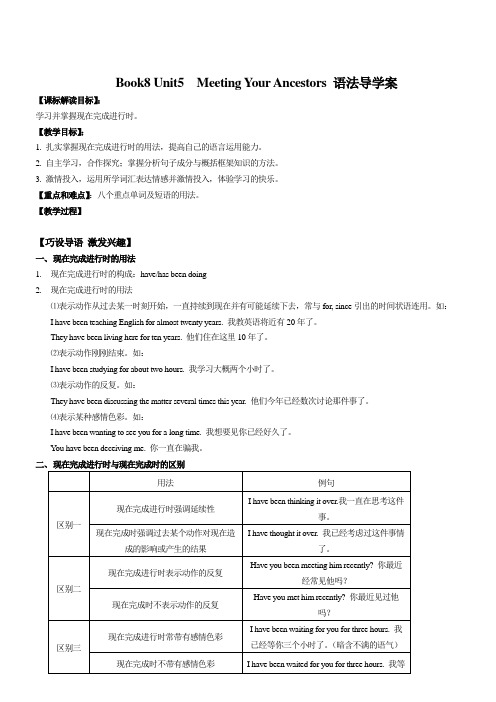
Book8 Unit5 Meeting Y our Ancestors 语法导学案【课标解读目标】:学习并掌握现在完成进行时。
【教学目标】:1. 扎实掌握现在完成进行时的用法,提高自己的语言运用能力。
2. 自主学习,合作探究;掌握分析句子成分与概括框架知识的方法。
3. 激情投入,运用所学词汇表达情感并激情投入,体验学习的快乐。
【重点和难点】:八个重点单词及短语的用法。
【教学过程】【巧设导语激发兴趣】一、现在完成进行时的用法1.现在完成进行时的构成:have/has been doing2.现在完成进行时的用法⑴表示动作从过去某一时刻开始,一直持续到现在并有可能延续下去,常与for, since引出的时间状语连用。
如:I have been teaching English for almost twenty years. 我教英语将近有20年了。
They have been living here for ten years. 他们住在这里10年了。
⑵表示动作刚刚结束。
如:I have been studying for about two hours. 我学习大概两个小时了。
⑶表示动作的反复。
如:They have been discussing the matter several times this year. 他们今年已经数次讨论那件事了。
⑷表示某种感情色彩。
如:I have been wanting to see you for a long time. 我想要见你已经好久了。
Y ou have been deceiving me. 你一直在骗我。
真题研讨:考点指南1:从动作重复性的角度考查现在完成进行时的基本用法。
典例1. (2011北京高考)Tom ________ in the library every night over the last three months.A.worksB. workedC. has been workingD. had been working答案研讨:C 考察时态。
人教版高中英语选修八教案:Unit1.doc

Book 8 Unit1精美句子1、善思则能“从无字句处读书”。
读沙漠,读出了它坦荡豪放的胸怀;读太阳,读出了它普照万物的无私;读春雨,读出了它润物无声的柔情。
读大海,读出了它气势磅礴的豪情。
读石灰,读出了它粉身碎骨不变色的清白。
2、幸福幸福是“临行密密缝,意恐迟迟归”的牵挂;幸福是“春种一粒粟,秋收千颗子”的收获. 幸福是“采菊东篱下,悠然见南山”的闲适;幸福是“奇闻共欣赏,疑义相与析”的愉悦。
幸福是“随风潜入夜,润物细无声”的奉献;幸福是“夜来风雨声,花落知多少”的恬淡。
幸福是“零落成泥碾作尘,只有香如故”的圣洁。
幸福是“壮志饥餐胡虏肉,笑谈渴饮匈奴血”的豪壮。
幸福是“先天下之忧而忧,后天下之乐而乐”的胸怀。
幸福是“人生自古谁无死,留取丹心照汗青”的气节。
3、大自然的语言丰富多彩:从秋叶的飘零中,我们读出了季节的变换;从归雁的行列中,我读出了集体的力量;从冰雪的消融中,我们读出了春天的脚步;从穿石的滴水中,我们读出了坚持的可贵;从蜂蜜的浓香中,我们读出了勤劳的甜美。
4、成功与失败种子,如果害怕埋没,那它永远不能发芽。
鲜花,如果害怕凋谢,那它永远不能开放。
矿石,如果害怕焚烧(熔炉),那它永远不能成钢(炼成金子)。
蜡烛,如果害怕熄灭(燃烧),那它永远不能发光。
航船,如果害怕风浪,那它永远不能到达彼岸。
5、墙角的花,当你孤芳自赏时,天地便小了。
井底的蛙,当你自我欢唱时,视野便窄了。
笼中的鸟,当你安于供养时,自由便没了。
山中的石!当你背靠群峰时,意志就坚了。
水中的萍!当你随波逐流后,根基就没了。
空中的鸟!当你展翅蓝天中,宇宙就大了。
空中的雁!当你离开队伍时,危险就大了。
地下的煤!你燃烧自己后,贡献就大了6、朋友是什么?朋友是快乐日子里的一把吉它,尽情地为你弹奏生活的愉悦;朋友是忧伤日子里的一股春风,轻轻地为你拂去心中的愁云。
朋友是成功道路上的一位良师,热情的将你引向阳光的地带;朋友是失败苦闷中的一盏明灯,默默地为你驱赶心灵的阴霾。
人教案高中英语选修8 Unit 1 知识点导学案(五)
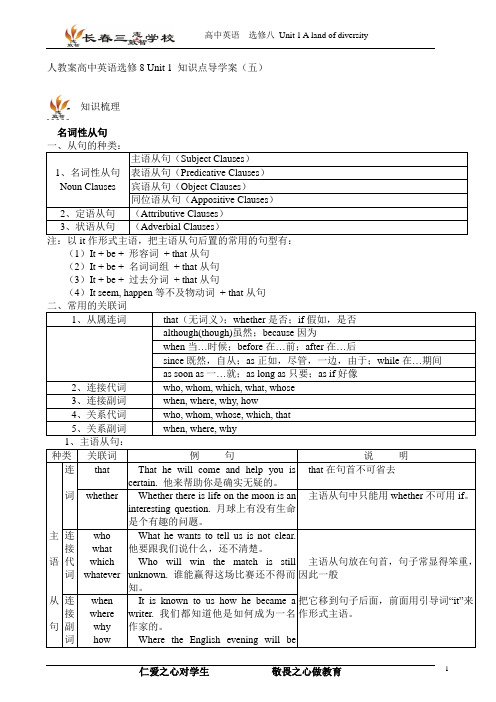
人教案高中英语选修8 Unit 1 知识点导学案(五)知识梳理名词性从句主语从句(Subject Clauses)1、名词性从句表语从句(Predicative Clauses)Noun Clauses 宾语从句(Object Clauses)同位语从句(Appositive Clauses)2、定语从句(Attributive Clauses)3、状语从句(Adverbial Clauses)(1)It + be + 形容词+ that从句(2)It + be + 名词词组+ that从句(3)It + be + 过去分词+ that从句(4)It seem, happen等不及物动词+ that从句1、从属连词that(无词义);whether是否;if假如,是否although(though)虽然;because因为when当…时候;before在…前;after在…后since既然,自从;as正如,尽管,一边,由于;while在…期间as soon as一…就;as long as只要;as if好像2、连接代词who, whom, which, what, whose3、连接副词when, where, why, how4、关系代词who, whom, whose, which, that5、关系副词when, where, why种类关联词例句说明连that That he will come and help you iscertain. 他来帮助你是确实无疑的。
that在句首不可省去词whether Whether there is life on the moon is aninteresting question. 月球上有没有生命是个有趣的问题。
主语从句中只能用whether不可用if。
主语连接代词whowhatwhichwhateverWhat he wants to tell us is not clear.他要跟我们说什么,还不清楚。
人教版选修八Unit 5 语法学案

人教版选修八Unit 5 语法学案Book 8 Unit 5 GrammarThe present perfect continuous tense----现在完成进行时1 定义: 一般表示动作从过去某一时间可是一直延续到现在,现在这个动作可能刚刚终止,也可能仍然在进行着。
2 现在完成进行时的构成:现在完成进行时是由“have/has+been+动词的现在分词”构成3 现在完成进行时的基本句型:肯定式have \ has been V.ing疑问式Have \ Has sb. been V.ing?简略回答Yes,sb. have\ has . No,sb. haven't\ hasn't4 现在完成时的用法1)在强调指出动作还未结束,还要继续下去。
如:I've been reading this book for two hours,but I haven't finished it. 这本书我已读了两个小时了,但我还没读完。
2)强调动作延续时间的长久或带感情色彩。
She has always been working like that她一贯是这样工作的。
3)现在完成进行时也可表示现在以前这段时间反复发生的事情。
We've been seeing quite a lot of each other recently.最近我们经常见面。
5 现在完成时和现在完成进行时的区别(1) 现在完成时的“已完成”用法强调动作的完成,而现在完成进行时表示动作未完成。
试分析:I’ve been waiting for a long time.He’s been sitting here all morning.(6) 有些表示状态,感情,感觉的动词如:have,exist,like,hate,hear,know,sound等动词不能用于现在完成进行时,但可用于现在完成时。
人教版高中英语选修8《Unit 1 A land of diversity》教案2篇
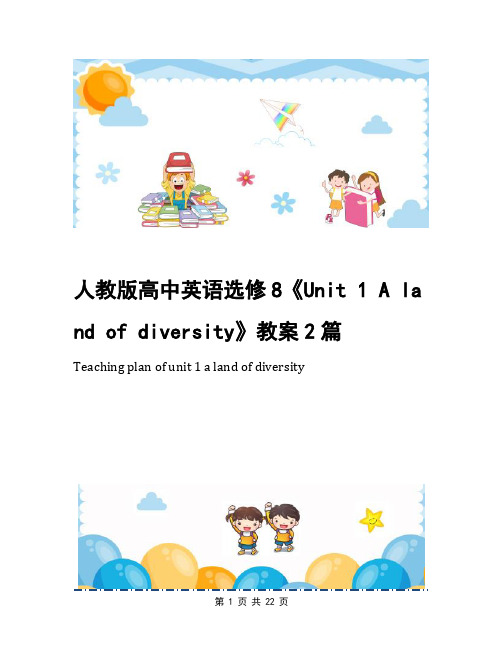
人教版高中英语选修8《Unit 1 A la nd of diversity》教案2篇Teaching plan of unit 1 a land of diversity人教版高中英语选修8《Unit 1 A land of diversity》教案2篇前言:英语作为在许多国际组织或者会议上都是必需语言,几乎所有学校选择英语作为其主要或唯一的外语必修课。
英语教学涉及多种专业理论知识,包括语言学、第二语言习得、词汇学、句法学、文体学、语料库理论、认知心理学等内容。
本教案根据英语课程标准的要求和教学对象的特点,将教学诸要素有序安排,确定合适的教学方案的设想和计划、并以启迪发展学生智力为根本目的。
便于学习和使用,本文档下载后内容可按需编辑修改及打印。
本文简要目录如下:【下载该文档后使用Word打开,按住键盘Ctrl键且鼠标单击目录内容即可跳转到对应篇章】1、篇章1:人教版高中英语选修8《Unit 1 A land of diversity》教案2、篇章2:人教版高中英语选修8《Unit 1 A land of diversity》教案篇章1:人教版高中英语选修8《Unit 1 A land of diversity》教案教学准备教学目标三、教学目标1.知识技能目标1)能从文中获取主要信息,如获取What happened to the Native Americans after the arrival of the Europeans? After all those sufferings, did all Native Americans choose to leave the land? How do you know (from the text)? 等直接信息能力;2)能从文本中加工和处理信息,如What did the Spanish do to the Native Americans in the 16th century?(此问题需提取数个段落的文本信息)Two groups of immigrants had something in common. What are they? (double choices) Why? (此问题需要学生从文字的表面信息加工处理后方可得到答案)3)能透过信息表层思考人文精神,培养学生的发散性思维与批判性思维,如what do you think of the Native Americans who survived and stayed at CA?How do you think the Europeans could have succeeded in making the Native Americans slaves or even kill them?Do you think language plays an important part ina culture? 等。
人教版选修8unit1教案

选修8(新课标人教版)教案英语组王宏波Help the students learn how to know the parts of speech according to the suffixes.Teaching important pointsGet the students to know the word about the USA.Teaching difficult pointsGet the students to know the word formation by adding suffixes.Teaching methodsStudy individually, practice in groups.Teaching aidsA computer and a recorder.Teaching procedures & waysStep Ⅰ RevisionAsk the students to discuss the question in Activity 3 on page 3, trying to explain the reasons in their own words and write 3 ~ 4 sentences. Ask them to share their answers and show their opinions.Step Ⅱ SuffixationFirst, ask the students to show their collected suffixes. Ask them to review the function of verbs, nouns and adjectives. And then ask them to fill in the charts with the proper forms of the words by practicing Activity 1 on page 4. At last, check the answers with the whole class.Step III Homework1. Ask the students to finish Activities 1-3 on page 48 in the workbook.2. Ask the students to prepare for the grammar about the Noun Clauses.The Third Period GrammarTeaching goals1. Target languageThe Noun Clauses, occur to2. Ability goalsEnable the students to identify the different types of the Noun Clauses and learn to use them.3. Learning ability goalsHelp the students learn how to use the Noun Clauses.Teaching important points Enable the students to use the Noun Clauses.Teaching difficult pointsEnable the students to distinguish different types of noun clauses.Teaching methodsComparing and practice.Teaching aidsA projector, a computer and a blackboard.Teaching procedures & waysStep Ⅰ RevisionCheck the homework.Step Ⅱ PresentationAt first, get the students to know what a noun clause is and what role it plays in the sentences. Then, discuss noun clauses as objects. Next, give them an example to show what are Noun Clauses and in what situations they should use them. At last show them the sentence structures of the Noun Clauses.Show the following.· That-clauses:I believe that you can learn noun clauses well.· If / whether clauses:The teacher must determine if / whether they are ready to study noun clauses.· Wh-clauses begin with words like who, what, how, whenever, which, etc:First you need to explain what a noun clause is.I know how I can make you learn noun clauses.Step Ⅲ PracticeAsk the students to practice Activities 1~4 on page 5. For Activities 1~2, discuss what role these clauses play in the sentences in pairs. For Activity 3, ask them to make sentences containing noun clauses on their own. For Activity 4, complete the dialogue with the given sentences in pairs. At last, check the answers with the whole class.Go on with the Activities 2-4. Then check the answers with the students.Step IV HomeworkAsk the students to do the following.1. Finish Activity 2 on page 49 in the workbook.2. Sum up all the conjunctions used with noun clauses and compare it with the conjunctions used with attributive clauses. Then tell the differences between them. Practice Activity 2 on page 49 (Workbook).3. Prepare for the “Using Language” part on pages 6~9 and surf the Internet to find the related information.The Fourth Period Integrating skills(Ⅰ)Teaching goals1.Target languagea. 重点词汇和短语luggage, tram, apparent, apparently, slip, bakery, ferry, hire, seagull, insert, react, team up with, mark out, take in, a great / good manyb. 重点句式Talk about traveling to some placesWhere have you visited recently?What is the climate like?What did you think about the people?What other interesting things did you see?That’s interesting / te rrific / marvelous / cool / lovely!You’re exciting / excellent.Good / Creative / Fantastic / Super job!2. Ability goalsEnable students to talk about places and learn to write an email or a postcard.3. Learning ability goalsHelp students learn how to talk about places and learn to write an email or a postcard.Teaching important pointsHow to talk about places.Teaching difficult pointsHow to write an email or a postcard.Teaching methodsListening, speaking and discussion.Teaching aidsA projector, a computer and a recorder.Teaching procedures & waysStep Ⅰ RevisionCheck the homework.Step Ⅱ Listening and speakingListeningAsk the students to listen to a conversation about the George’s tour around California. Then ask them to practice Activities 1~4 on pages 6~7. For the first time, ask the students to number the things they talk about.Check the answers by asking some students to read the completed postcard.Ask the students to listen to the tape and discuss the questions in pairs and write some of the things Christie says in pairs.SpeakingFor Activity 5, let them discuss in groups of 4 and later ask some of them to give their opinions. Step Ⅲ ReadingAsk the students to look at the given photos and read the George’s diary on pages 8 quickly. Then practice Activity 1 and fill in the chart in pairs.Ask the students to check the answers with their partners.For Activity 2, ask students to rea d the George’s diary on page 8 carefully and then answer the questions in pairs. Check the answers with the whole class.Ask the students to read the diary again by themselves. Then discuss in groups of 4 and practice Activities 3~4. A few minutes later, ask some of them to show their work.Sample answers:Reasons for omitting:1. Some unimportant, unnecessary, uninteresting little words like pronouns “we”, “I”, articles “a”, “the”, or prepositions. If omitted, the meaning can’t be affected and misunderstoo d by others.2. Just keep the key words without explaining more in details.Step Ⅳ HomeworkAsk the students to finish Activity 5 on page 9.The Fifth Period Extensive readingTeaching goals1. Target languagea. 重点词汇和短语consider, achievement, personality, enthusiastic, autobiography, musician, recording, trumpet, funeral, ceremony, coffin, march, ceremonyb. 重点句子He was noticed by... called... who... to teach... and to find...He spoke publicly about..., using his fame to help...2. Ability goalsEnable the students to find the topic of each paragraph and find the clue to show the important events.3. Learning ability goalsHelp the students learn how to find the topic of each paragraph and find the clue to show the important events.Teaching important pointsHow to find the clue to show the important events.Teaching difficult pointsHow to find the topic of each paragraph.Teaching methodsSkimming, scanning and discussion.Teaching aidsA recorder, a computer and a projector.Teaching procedures & waysStep Ⅰ RevisionCheck the homework by asking some students to show their work.Step Ⅱ Listening (Ⅰ)First, ask the students to listen to the tape and complete the notes. Check the answers by asking some students to read their notes.Then get them to discuss the questions in Activity 2 and talk about New Orleans.Ask the students to tick the boxes in Activity 3 and complete Activity 4; complete the activities after listening again.Then check the answers with the whole class.Step ⅢPre-readingT: “You can’t play anything on modern trumpet that doesn’t come from him. I can’t even remember a time when he sounded bad playing the trumpet. Never. Not even one time. He had great feeling up in his playing and he always played on the beat. I just loved the way he played and sang.” This is a comment about a jazz musician. Can you guess who the jazz musician was?S1: Louis Armstrong. I still think no one can beat Louis Armstrong and Chet Baker when it comes to trumpets, and when it comes to saxophone, Buddy Arnold is my fellow anything.T: What else do you know about him?S2: Louis Armstrong was the greatest of all Jazz musicians.S3: Armstrong defined what it was to play Jazz. His amazing technical abilities, the joy and spontaneity, and amazingly quick, inventive musical mind still dominate Jazz to this day.T: He was the grandfather of jazz. He was very successful because he always thought, “What we play is life.” Today we’re going to learn more about the famous musician.Step ⅣReadingSkimmingAsk the students to read through the whole passage and then do Activity 1 on page 52 and discuss the main topic of each paragraph in groups of 4. At last, check the answers with the whole class. Show the following on the screen.ScanningFor Activity 2, get the students to read the text again and then work together with their partners to make a time c hart to show the important events in Louis Armstrong’s life. Give them a few minutes to fill in the form. Check the answers with the whole class.Show the following on the screen.Step Ⅴ Homework1. Ask the students to read the passage again after class and do Activity 3 and list the reasons why the writer says that Louis Armstrong was considered great.2. Ask the students to talk about and write about some places in China.The Sixth Period Integrating skills(Ⅱ)Teaching goals1. Target languagea. 重点词汇和短语nationality, location, geographical fractures, production, interview, cultureb. 重点句式Talk about placesWhen did people first live there?What’s the climate like?Why is it so warm/cold/dry/wet there?What’s the population of the city or province?How many nationalities live there?What is the most important festival there? How do they celebrate it?2. Ability goalsEnable the students to talk about and write about places.3. Learning ability goalsHelp the students learn how to talk about and write about places.Teaching important pointsHow to talk about places.Teaching difficult pointsHow to write about places.Teaching methodsDiscussion.Teaching aidsA projector, a computer and a recorder.Teaching procedures & waysStep Ⅰ RevisionCheck the homework. First ask the students to discuss Activity 3 in groups of 4. Then share the reasons why the writer says that Louis Armstrong was considered great.Step Ⅱ TalkingFor Activity 1 on page 47, ask the students to discuss a city or province in China that has amixture of different cultures in groups of 4, filling in the given chart and answering the questions in the textbook.Step Ⅲ Speaking and writing taskAsk the students to read the tips and steps given in the textbook and talk about a Chinese city, province or zone in groups of 4. Then ask them to write a description.Step Ⅳ Homework: ProjectAfter class, ask the students to study small pieces of the USA, its culture and its people and then put all the pieces together to form a more complete picture. In this project, each student should choose a different aspect of America to research and then present his or her information to the rest of the class. They can use the library or search for information on the Internet.Unit 2 CloningⅠ. 单元教学目标Skill GoalsTalk about cloningPractice expressing and supporting an opinionUse the appositive clauseWrite a composition about cloningⅡ. 目标语言功能句式Expressing and supporting an opinion I’m happy to accept... but...I would never accept... I’m not bothered about...I don’t mind but...I hope you’ll carry on...Are you sure you want to...? I agree with you that...Is it fair to...? Do you think it is wise to...?I think you should... Well done to you for... I don’t understand why you don’t...I can’t help thinking...I could never agree to...词汇四会词汇Differ exact twin commercial straightforward undertake breakthrough procedure carrier cast altogether arbitrary correction object objection medium obtain attain moral conservative forbid accumulate constitution compulsory opera chorus loaf flour owe shortly retire bother assumption regulation strike initial vain resist drawback merely decoration unable feather turkey claw adore hatch reasonable 2.词组cast down, object to, the media, in favour of,(be)bound to(do)..., from time to time, bring back to life, pay off, in vain结构:Appositive clause — that 可引导同位语从句重点句子:It is a way of... P11 The fact is that... P11The question that occurred ... P12 The advantage is that... P15The First Period ReadingStep I Lead-inLook at picturesT: Look at the pictures and discuss which ones are natural clones and which ones are man-made. Then explain how they differ.S: I think the twins are natural clones and the Dolly sheep is man-made.T: You are right! Can you explain how they differ?S: The twins were born at the same time, but the Dolly sheep is man-made.T: Anything else? Who want have a try?S: I think the identical dog is man-made.T: Good job!Step Ⅱ Pre-readingBefore class, ask the students to search for some information about this topic. Now show your questions on the screen, and then let them discuss with each other.Questions about cloning:1. What is a clone?2. How is a clone produced?3. What benefits can humans gain from cloning?4. What problems may arise when humans are cloned?5. Should we clone human?6. Could cloning replace sex as the means of creating new human life?7. Could a parent clone a child who is dying of a terminal illness?Suggest answers:1. It is a way of making an exact copy of another animal and plant.2. This happens in plants when gardeners take cuttings from growing plants to make new ones, and when small parts of a plant are taken and gown in a laboratory. It also happens in animals when twins identical in sex and appearance are produced from the same original egg.3. It can help cure disease and can help couples who have no baby to bear a new baby.4. There may be more bad people like Hitler.5. In my opinion, I do not agree, for it may cause many moral problems.6. No. Because cloned human has the same quality as the real human, natural born baby’s quality is higher than his parents.7. No. The cloned baby also has the disease.Step Ⅲ While-readingGet the students to comprehend the passage quickly and accurately and meanwhile help the students form a good habit of reading.divide the whole passage into several parts and find out the main idea of each part.Show the following.Para. 1 Cloning is a way of making an exact copy of another animal and plant.Para. 2 Cloning has two major uses.Para. 3 The problems of Dolly.Para. 4 The effect of Dolly.Para. 5 It is forbidden to clone human being.Step Ⅳ Post-readingAsk the students to read the passage again to finish three tasks.T: Now let’s listen to the tape. While listening, pay more attention to the correct pronunciation and tone. Then read the text by yourselves to get the answers to the three tasks. You can work in groups.T: First, what are the problems or dangers of cloning?S: Let me have a try! First, the cloned animals have the same illness of the old animals and the same goes with the other species. Second, the cloned animals have short life and can cause moral questions.T: You are right! And what are the advantages of cloning?S: I know! Firstly, gardeners use it all the time to produce commercial quantities of plants. Secondly, it is valuable for research on new plant species and for medical research on animals. Third ly, it suddenly opens everyone’s eyes to the possibility of using cloning to cure serious illnesses, and even producing human beings.T: What is the writer’s opinion? What do you think is the writer’s point of view in this reading passage? Is it in favour of cloning or against it?S1: I think the writer is in favour of it, because there are many advantages of cloning. It can help people solve many problems in our daily life.S2: I think the writer doesn’t agree with it, because if the cloning technology can be used in an evil way, it can cause much trouble to our society.T: The next question: What is your opinion of cloning? Give the reasons.S1: As a coin has two sides, everything has two aspects. First, if the cloning is used in a correct way it can bring many conveniences to us. Such as: curing serious illnesses and being used to produce commercial qualities of plants. On the other hand, if the cloning is used in an evil way it can cause much troubles: such as moral questions.S2: My view on cloning and nuclear transfer is that it is ethical. So actually I find no reason to clone presently. I have this opinion currently, because scientists are unable to successfully clone using nuclear transfer as of today.Step Ⅴ HomeworkAsk the students to do the following.1. Complete the exercises on page 13.2. Recite the key sentences in the text.3. What is Clone? You might not believe it, but there are human clones among us right now. Have you ever wished you could have a clone of yourself to do homework while you hit the skate park or went out with your friends? Imagine if you could really do that. Where would you start?The Second Period ListeningStep I Revision1. Greetings2. RevisionStep Ⅱ Pre-listeningWork in groups to discuss how we should behave towards the human clones.T: Before human clones become part of our life, perhaps we should spend some time thinking about how we should behave towards them. Now, work in groups to discuss the followingquestions.Show the following.1. How would you treat human clones?2. Do you think they should have legal and political rights, such as getting married or voting?3. Do you think they are separate people or part of the original donor?Sample answers:1. I will treat them as normal people.2. Yes, I think they should have the legal and political rights.3. I think they are separate people.Step Ⅲ ListeningThe students are asked to read fast the questions and multiple answers to find out the listening points first, and then listen to the tape twice to choose the best answer.Step Ⅳ Listening task (P57)First, ask the students to read these sentences and then listen to the tape and decide if they are facts or opinions. Play the recording and then check the answers with the class.Sample answers:Arguments for cloning pets:1. Favorite pets can live forever as clones.2. It is moral to clone pets for their owners.Arguments against cloning pets:1. Many people don’t agree with cloning.2. Some people think that cloning pets is selfish.Step Ⅴ HomeworkT: Boys and girls, today we have listened to some materials about cloning. I do hope you can listen to the materials again after class so that you can get very familiar with them. Besides, please preview the reading. Now class is over. Goodbye, everyone.The Third Period SpeakingStep Ⅰ Lead-inStep Ⅱ Read and answer (P16)To answer these three questions, teacher can give the students some examples as explanation, for example, Question 1.T: Now think about this question: if in the world there is only one sheep and human beings want to clone more. Some days later a Dolly appears, then many more. But one day all sheep get the same deadly disease. Now please think about what the results are.S: Maybe they would all die.T: Why?S: Because all sheep have the same arrangement of genes.T: Right. Now can you answer Question 1? Why shouldn’t you clone an extinct animal unless there is enough diversity in the group?S: It is useless to clone an animal if there is not enough diversity in the group for it to overcome illnesses.T: Why is it wrong to clone an extinct animal if it would have to live in a zoo?S: If the cloned animals have to live in the zoo, it is unfair to them. They need freedom.T. Why can’t you clone the DNA of animals that have be en extinct longer than 10,000 years?S: Dinosaurs disappeared 65,000,000 yeas ago. So the chance of dinosaurs returning to the earth is merely a dream.Step Ⅲ Discussion (Question 2)This is a speaking task. Ask the students to have a discussion in groups, organize their words properly, and give vivid description of the chosen animals.T: Now look at the table on page 16, discuss in pairs which extinct animals described are worth restoring by means of cloning. Choose one animal and use the information to help you argue why this animal should be restored to the earth.Give the students six minutes to discuss.Step Ⅳ Writing a report (P17)Deal with Questions three and four. Divide the whole class into four groups. Then they can have a competition.T: Now everyone, imagine all of you are owners of your chosen animal. Now work together, and give us a vivid description of your pet, then I will decide which one is the best to be resorted to the earth.Several minutes later, the students give performances. At the same time, list some major points on the blackboard.T: Well done everyone. It is really hard for me to choose, let us vote OK?Step Ⅴ TALKING (P55)Ask the students to talk about the questions with the teacher’s help.T: Look at the questions on page 54. Do you know how to show your opinion? You can discuss the following questions with your partner and use these expressions on page 54.1. How would you feel about having a clone of yourself in the family?2. What problems did you have growing up and how can you help him / her avoid them.Step Ⅵ HomeworkT: Write down your feelings and attitudes towards clone. Combine them into a composition.The Fourth Period GrammarStep Ⅰ RevisionCheck the students’ homework.Step ⅡGrammarT: Do you know the appositive clauses? Please pick out three more examples from the reading passage.Sample answers:The fact is that they are natural clones of each other.The whole scientific would follow the progress of the first successful clone, Dolly the sheep. Altogether Dolly lived for six years, half the length of the life of the original sheep.T: Now let me explain something about the appositive clauses. The appositive clause is a clause used as an appositive. The clause is an explanation to the noun before. The appositive clause belongs to noun clauses. Most of the appositive clauses may be introduced by the conjunction that.A content clause is frequently in apposition with such nouns as fact, news, idea, thought, question, reply, report, remark, hope, belief, suggestion etc.Some examples:Nobody shares my belief that he was mad.My suggestion that he was mad was not accepted.They are familiar with the opinion that all matter consists of atoms.Where did you get the idea that I could not come?We haven’t yet settled the question where we are going to spend our summer vacation.The suggestion came from the chairman that the new rule should be adopted.T: The words the fact are often inserted in front of an object clause when the clause cannot be conveniently connected with the verb either directly or by means of the representative it.This cannot hide the fact that he is growing old.We must face the fact that we are living in a revolutionary world.Some supplements:同位语从句与that引导的定语从句1) 从先行词看同位语从句与名次之间在逻辑上是“主语+be+表语”的关系。
- 1、下载文档前请自行甄别文档内容的完整性,平台不提供额外的编辑、内容补充、找答案等附加服务。
- 2、"仅部分预览"的文档,不可在线预览部分如存在完整性等问题,可反馈申请退款(可完整预览的文档不适用该条件!)。
- 3、如文档侵犯您的权益,请联系客服反馈,我们会尽快为您处理(人工客服工作时间:9:00-18:30)。
高二英语选修8 Unit 1 第五课时using language
Teaching goals:
Enable the ss to learn about how to write a diary.
Find the places mentioned in the text.
Part 1 Reading and answering
Quickly read Geoge’s diary. He wrote this part of his diary when he was in San Francisco. Write the things he saw in these days.
⏹Monday 12th, June:
⏹Tuesday 13th,June:
⏹Wednesday 14th, June
1.able car:When was it invented?who?why?
2.sherman’s wharf
the district_____________________________ Array
It is
a tourist area_____________________________
the place________________________________
3.chinatown
Name the things that visitors can do in it.
4.Angel Island
Part 2 Language points
1.Teamed up with a couple from my hotel.
team up with: make an effort in cooperation with; work together with
Translate:
He teamed up with an experienced worker in the project.
2.It’s a 79km round-trip that takes in all famous tourists spots.
take in:___________;__________ __;__________________;_________ ______________;
Eg. 1)He had nowhere to live in, so we took him in.
2)The dress needs to be taken in.
3)They listened to my lecture, but how much did they take in , I wonder?
4)Don’t let yourself be taken in by these politicians.
思维拓展:连线
take off 拆开,拆散
take on 贬低, 贬损名誉等
take apart 从事,对…..产生兴趣,打听,占用空间或时间
take away from 脱下,脱去,起居,休假,离开
take up 开始雇佣,露出,承担,接受
3.a great many: a large number (of);
There are a great many reasons why you shoudn’t do it.
remember: it is only used to modify countable nouns.
4.formal informal
5. feel like doing sth:to have a wish for; want。
